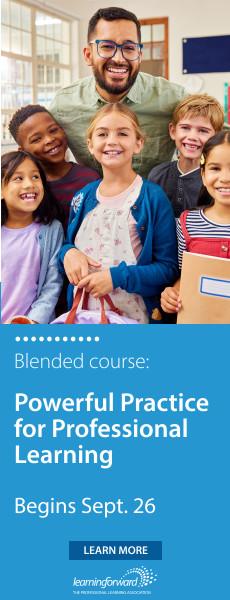Activities Vs. Outcomes
The difference makes all the difference
By Learning Forward
Categories: Learning communities, OutcomesOctober 2015
Read the remaining content with membership access. Join or log in below to continue.
Sed ut perspiciatis unde omnis iste natus error sit voluptatem accusantium doloremque laudantium, totam rem aperiam, eaque ipsa quae ab illo inventore veritatis et quasi architecto beatae vitae dicta sunt explicabo. Nemo enim ipsam voluptatem quia voluptas sit aspernatur aut odit aut fugit, sed quia consequuntur magni dolores eos qui ratione voluptatem sequi nesciunt. Neque porro quisquam est, qui dolorem ipsum quia dolor sit amet, consectetur, adipisci velit, sed quia non numquam eius modi tempora incidunt ut labore et dolore magnam aliquam quaerat voluptatem.
This article is a follow-up to “Focus first on outcomes” (Bradley, Munger, & Hord, 2015), published in the August 2015 issue of JSD. That article set the stage by creating awareness of the need and purpose for thinking first about outcomes, not activities, when starting a change project. This article is designed to build knowledge, skills, and dispositions for how to consider outcomes first in order to see change.
Logic Model As A Road Map To Reach Intended Goal

6 Strategies For A Change

Teacher's IC Map For Developing Students' Understanding of Fractions

Monitoring Tools Aligned With Educated Outcomes

References
Affholter, D. (1994). Outcome monitoring. In Wholey, J., Hatry, H., & Newcomer, K. (Eds.), Handbook of practical program evaluation. San Francisco, CA: Jossey-Bass.
Bradley, J. (2015). Designing schools for meaningful professional learning: A guidebook for educators. Thousand Oaks, CA: Corwin Press.
Bradley, J., Munger, L., & Hord, S. (2015, August). Focus first on outcomes: When planning change, improved student learning is the ultimate goal. JSD, 36(4), 44-47, 52.
Drago-Severson, E., Roy, P., & Von Frank, V. (2015). Reach the highest standard in professional learning: Learning designs. Thousand Oaks, CA: Corwin Press & Learning Forward.
Hord, S.M. (2016). Beginning at the end. In Lindsey, D.B., Lindsey, R.B., Hord, S.M., & von Frank, V., Reach the highest standard in professional learning: Outcomes (pp. 43-69). Thousand Oaks, CA: Corwin Press & Learning Forward.
Hord, S.M. & Roussin, J.L. (2013). Implementing change through learning: Concerns-based concepts, tools, and strategies for guiding change. Thousand Oaks, CA: Corwin Press & Learning Forward.
Joyce, B. & Showers, B. (2002). Student achievement through staff development (3rd ed.). Alexandria, VA: ASCD.
Killion, J. (2008). Assessing impact: Evaluating staff development (2nd ed.). Thousand Oaks, CA: Corwin Press.
Learning Forward. (2012). Standards into practice: School-based roles. Oxford, OH: Author.
Love, N., Stiles, K., Mundry, S., & DiRanna, K. (2008). The data coach’s guide to improving learning for all students. Thousand Oaks, CA: Corwin Press.
McCawley, P. (n.d.). The logic model for program planning and evaluation. Moscow, ID: University of Idaho. Available at www.cals.uidaho.edu/edcomm/pdf/CIS/CIS1097.pdf.
Learning Forward is the only professional association devoted exclusively to those who work in educator professional development. We help our members plan, implement, and measure high-quality professional learning so they can achieve success with their systems, schools, and students.
Categories: Learning communities, Outcomes
Recent Issues
GLOBAL PERSPECTIVES
June 2024
What does professional learning look like around the world? This issue...
WHERE TECHNOLOGY CAN TAKE US
April 2024
Technology is both a topic and a tool for professional learning. This...
EVALUATING PROFESSIONAL LEARNING
February 2024
How do you know your professional learning is working? This issue digs...
TAKING THE NEXT STEP
December 2023
Professional learning can open up new roles and challenges and help...









